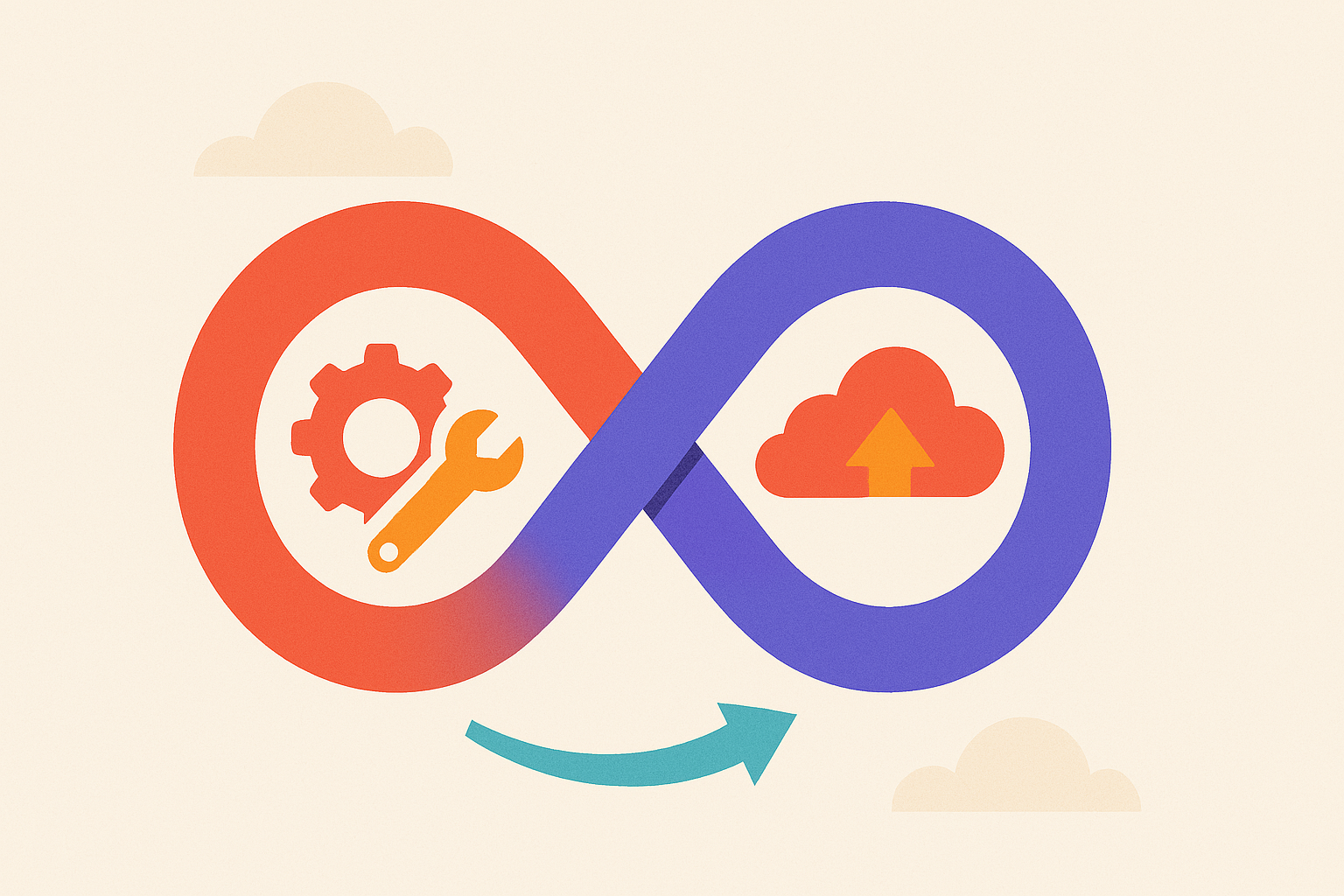How DevOps Enables Faster, More Reliable Software Delivery

Software delivery has come a long way from the days of monthly releases, manual deployments, and siloed teams. In today’s world - where speed, quality, and customer responsiveness are essential - traditional development models simply can’t keep up.
This is where DevOps comes into play. More than a set of tools or a role on a team, DevOps is a cultural and operational shift that enables faster, more reliable, and more sustainable software delivery.
When done right, DevOps breaks down barriers between development and operations, introduces automation at every stage of the pipeline, and empowers teams to ship with confidence. The result? Improved time-to-market, fewer failures, and systems that scale as the business grows.
Let’s explore how DevOps enables this transformation - and why it’s now a strategic imperative for any digital organisation.
What Is DevOps, Really?
At its core, DevOps is the convergence of development, operations, and increasingly, security into a unified approach to software delivery. It’s about aligning people, processes, and technology to enable:
Continuous integration and delivery
High automation and repeatability
Rapid feedback and iteration
Shared ownership of outcomes
DevOps encourages a culture where teams collaborate closely, embrace automation, and take collective responsibility for the health and performance of the systems they build and run.
How DevOps Accelerates Delivery
Here’s how DevOps drives both speed and reliability:
🚀 1. Continuous Integration and Continuous Delivery (CI/CD)
DevOps encourages teams to adopt CI/CD pipelines that automate the build, test, and deployment process. This reduces manual intervention, eliminates handoffs, and enables faster, more consistent releases.
CI/CD benefits:
Smaller, safer changes
Faster feedback loops
Reduced time between code commit and production
Ability to deploy multiple times per day
⚙️ 2. Infrastructure as Code (IaC)
Gone are the days of manually configuring environments. With IaC, infrastructure is defined, version-controlled, and provisioned through code - making it reproducible, auditable, and easy to scale.
IaC delivers:
Consistent environments across dev, test, and prod
Faster recovery and rollback
Reduced human error
Better collaboration between teams
🔍 3. Monitoring and Observability
DevOps practices embed observability into systems from day one. Logs, metrics, and traces are used not just for troubleshooting, but for proactively identifying performance bottlenecks, anomalies, and user experience issues.
With strong observability:
Incidents are detected earlier
Mean time to recovery (MTTR) is reduced
Teams learn faster from failures
Feedback drives continuous improvement
🧪 4. Automated Testing and Quality Gates
Testing is integrated into the pipeline - unit, integration, security, and performance tests all run automatically, giving teams confidence in their code before it reaches production.
This leads to:
Higher release quality
Reduced rework and firefighting
Increased trust in automation
Shorter release cycles without sacrificing stability
🤝 5. Collaboration and Shared Ownership
Perhaps the biggest shift DevOps brings is cultural. Developers are no longer “done” when code is written. Ops is no longer just “keeping the lights on.” Everyone is responsible for delivery and uptime.
This shared ownership:
Improves alignment and trust
Encourages continuous learning
Reduces finger-pointing during incidents
Builds more resilient, adaptive teams
DevOps Outcomes: What the Best Teams Achieve
High-performing DevOps teams deliver remarkable results, backed by research from the DORA (DevOps Research and Assessment) programme:
Faster lead times: Code goes from idea to production in hours, not weeks.
Higher deployment frequency: Teams deploy multiple times per day with confidence.
Lower change failure rate: Fewer defects and safer releases.
Shorter recovery times: Teams bounce back from failures quickly and learn effectively.
These are not just technical wins - they are business advantages. Organisations that embrace DevOps are more responsive to customers, more competitive in the market, and better equipped for long-term growth.
Getting Started: DevOps Isn’t All or Nothing
You don’t need to overhaul everything at once. DevOps transformation is iterative. Start with a few high-impact changes:
Automate the build-and-test process
Introduce infrastructure as code for your environments
Add monitoring and alerting for key services
Create cross-functional squads that own delivery end-to-end
Run regular retrospectives to learn and improve
Over time, these changes build a delivery ecosystem that is not just faster, but smarter and safer.
Key Takeaways
✅ DevOps is not a tool - it’s a way of working that aligns people, processes, and technology around delivering value.
✅ Speed and reliability are not in conflict - DevOps enables both through automation, feedback, and shared ownership.
✅ CI/CD, IaC, observability, and automated testing are foundational enablers of faster, higher-quality delivery.
✅ The real power of DevOps lies in culture - collaboration, trust, and continuous improvement.
✅ Teams that master DevOps don’t just deliver more - they deliver better.
Final Word
DevOps isn’t about deploying faster for the sake of speed. It’s about building systems - and teams - that can adapt, learn, and deliver value continuously.
It’s about creating an engineering culture where innovation is safe, quality is built in, and delivery becomes a strategic asset.
Because in today’s digital world, your ability to ship quickly and reliably isn’t just an operational concern.
It’s your competitive advantage.
Engineering leader blending strategy, culture, and craft to build high-performing teams and future-ready platforms. I drive transformation through autonomy, continuous improvement, and data-driven excellence - creating environments where people thrive, innovation flourishes, and outcomes matter. Passionate about empowering others and reshaping engineering for impact at scale. Let’s build better, together.
